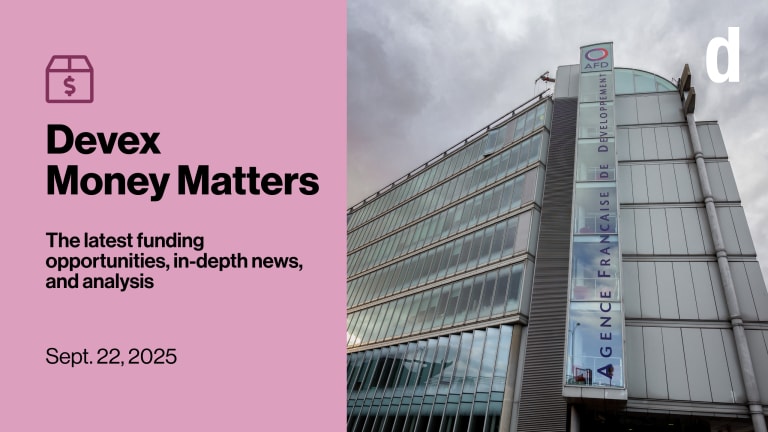The changing face of French aid
More grant money for traditional issues such as health and education is also aimed at countering Beijing's influence in Africa.
France’s latest legislation on development aid is not just about increasing spending, Foreign Minister Jean-Yves Le Drian told members of Parliament earlier this year. “Striving” for or “examining the possibility of reaching” — according to the National Assembly and Senate, respectively — the famous 0.7% target for spending gross national income on official development assistance by 2025 has won plaudits so far. But Le Drian said the bill, which is currently before the Senate and expected to come into force this summer, also represents a broader “change of model.” It cements moves that French President Emmanuel Macron flagged near the start of his term: increased use of grants, greater bilateral assistance, and more spending channeled through civil society organizations. As a programming law, it would commit the government to spending 0.55% of GNI on ODA in 2022. According to last month’s preliminary figures, France gave €12.4 billion in ODA in 2020, or 0.53% of GNI. Compared with 2019, bilateral aid was up 20.8% and aid to sub-Saharan Africa up 40%. The draft law is aimed principally at tackling crises and fragility, education, climate and the environment, gender equality, health, food security, water and sanitation, sustainable and inclusive growth, and governance. Africa is the focus, making up 18 of the 19 priority countries — with Haiti the 19th. The French government won praise from MPs for including an article that will channel the seized proceeds of corruption in Africa back to local civil society projects. And the bill would also create an aid evaluation commission, similar to the Independent Commission for Aid Impact in the United Kingdom, though whether the body will include MPs is yet to be resolved. Addressing lawmakers in February, Le Drian said development must be one of the pillars of French foreign policy “at the heart of our diplomacy,” adding: “It is a question of respecting our values, but it is also a question of solidarity. It is also a question of influence, and it is also a question of power.” “This new development policy is anchored in a geopolitics of development,” he said the next day in the assembly. “As competition between powers plays out everywhere, we must propose a different path to our partners from the [global] south. Some, in the guise of support, try to impose new forms of dependence on them. That is not our conception of influence; that is not the model that we are defending.” An interview on France Inter the following day left little doubt that Le Drian was talking about China, with which he said France is in a “war of development models and influence.” But Damien Barchiche, director of the sustainable development program at the Institute for Sustainable Development and International Relations, told Devex this week that efforts to link French development and diplomacy are not new. “The fact that now the amount that France will [allocate] to development in a context where the U.K. is cutting off part of its ODA is a way to show, ‘OK, probably during many years we were the ones always talking a lot ... and now we are going to be able to put money on the table,’” Barchiche said. “So in a sense, it’s a way to be more consistent.”
France’s latest legislation on development aid is not just about increasing spending, Foreign Minister Jean-Yves Le Drian told members of Parliament earlier this year.
“Striving” for or “examining the possibility of reaching” — according to the National Assembly and Senate, respectively — the famous 0.7% target for spending gross national income on official development assistance by 2025 has won plaudits so far.
But Le Drian said the bill, which is currently before the Senate and expected to come into force this summer, also represents a broader “change of model.”
This story is forDevex Promembers
Unlock this story now with a 15-day free trial of Devex Pro.
With a Devex Pro subscription you'll get access to deeper analysis and exclusive insights from our reporters and analysts.
Start my free trialRequest a group subscription Printing articles to share with others is a breach of our terms and conditions and copyright policy. Please use the sharing options on the left side of the article. Devex Pro members may share up to 10 articles per month using the Pro share tool ( ).
Vince Chadwick is a contributing reporter at Devex. A law graduate from Melbourne, Australia, he was social affairs reporter for The Age newspaper, before covering breaking news, the arts, and public policy across Europe, including as a reporter and editor at POLITICO Europe. He was long-listed for International Journalist of the Year at the 2023 One World Media Awards.








